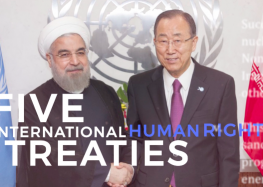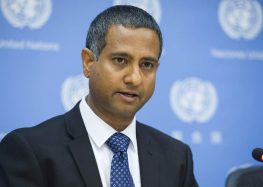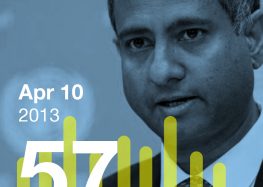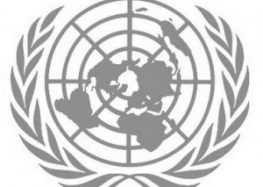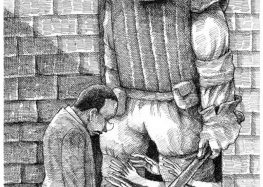Special Rapporteur Receives Widespread Support in Human Rights Council
Iranian Delegate Responds Angrily Without Addressing Report’s Content
Head of Iran’s Human Rights Council Mohammad Javad Larijani delivers his opening statements at today’s Human Rights Council
(Reporting from Geneva and New York)—Ahmed Shaheed, the UN Special Rapporteur on the Situation of Human Rights in Iran, presented his annual report today before the Human Rights Council in Geneva. Countries both in favor of and against the report, as well as Iran’s representative, asked questions and expressed their opinions about its contents, the Council’s future plans, and the Rapporteur’s mandate. One of the dramatic points of the meeting occurred when the head of Iran’s Human Rights Council, Mohammad Javad Larijani, displayed anger and used language that compelled the chair of the meeting to interrupt him.
Special Rapporteur Ahmed Shaheed delivers his opening statement in front of member states, the Iranian delegation, and NGOs
This week, the International Campaign for Human Rights in Iran released a new report for the diplomatic community detailing Iran’s non-cooperation with UN human rights bodies. The report, “Monitoring Iran: One Year into the Mandate of the Special Rapporteur on the Situation of Human Rights in Iran,” sets forth the Iranian government’s failure to adhere to international human rights standards and defiance of UN recommendations since the creation of the Special Rapporteur’s mandate in March 2011.
The level of support for the Special Rapporteur’s mandate and the interest in the points he raised in his report have increased the probability of an extension of his mandate for an additional year. Diplomatic sources in Geneva told the Campaign that it is very likely that the Special Rapporteur’s mandate will be extended for another year.
Shaheed presented his report to the Human Rights Council at a time when Iran’s government media have been conducting an organized attack campaign against him: in recent days, they have been presenting false information to question his mission without regard for the contents of his report. For example, on Saturday, Iranian government newspapers and national news agencies claimed that Shaheed’s report was written “without regard for the 300-page documented and detailed report by the Islamic Republic.” However, such a report was never submitted to him, as the Islamic Republic has had the Rapporteur’s report since early January 2012 but has not provided any substantive reactions—written or otherwise—to its content. Today, the Iranian delegation handed the Rapporteur a short document which they claim addresses his report.
In his talk, Shaheed referred to the Iranian government’s lack of cooperation and lack of response to the issues listed in his report. He also stated that no dialogue has taken place around this lack of cooperation, pointing out the Iranian authorities’ unwillingness to cooperate with the Rapporteur’s mandate. Though Shaheed had previously referred to interviews with dozens of victims and witnesses of human rights violations, in the face of criticism from the Iranian authorities raised against the accuracy of his claims in the absence of a visit to the country, for the first time Shaheed announced that he had spoken with 163 first-hand witnesses—victims of human rights violations—both outside and inside Iran, and that his conversations confirmed points raised by international human rights organizations and human rights defenders.
He then elaborated on the different sections of his report. He referred to the 18-year prison sentence for Abdolfattah Soltani and the six-year sentence of Narges Mohammadi. Referring to the dramatic increase in the number of executions in Iran, he demanded an immediate moratorium on executions in the country. The Special Rapporteur also welcomed the elimination of stoning from the Islamic Penal Code, but pointed out that such a sentence may still be issued and carried out based on fatvas by judges. He welcomed the release of prisoners of conscience Parastoo Dokouhaki, Marzieh Rassouli, and Sahamoddin Bouraghani, while referring to the cases of others who remain in prison, such as Nasrin Sotoudeh, Bahareh Hedayat, Abdollah Momeni, and Youcef Nadarkhani. Shaheed also asked for the immediate release of political opposition leaders Mir Hossein Mousavi and Mehdi Karroubi.
UPDATE:
After the Special Rapporteur’s presentation, Javad Larijani took to the microphone and, with an angry tone and inappropriate language, launched a verbal attack on the report. He called Ahmad Shaheed “ignorant” and “biased,” stating that the current trend at the Human Rights Council is “a new phenomenon” that has been developed under the “United States of America and its European collaborators and Zionist mafia.”
During his talk, Larijani’s tone and language surprised the attendees to the point that the head of the session interrupted him and the US representative protested that the representative from Iran was using language inappropriate for the gathering. A European diplomat told the Campaign, “The conduct of the Iranian representative [Javad Larijani] was not appropriate for a UN meeting. It is inaccurate to tie anything that happens with respect to Iran to the US. The media and civil society in Europe and in other countries are sensitive to the violations of human rights in Iran, and this is why they talk about it.”
Larijani continued his response by saying that the Islamic Republic of Iran welcomes cooperation with human rights mechanisms, even though he called Shaheed “ignorant” and accused his report of lacking any substance.
After member states spoke for and against the Iran report, Shaheed presented his replies and Larijani spoke again. Larijani once more questioned the report’s accuracy, stating that he wished to repeat that the report is “biased” and “unprofessional” and contains a large number of “unfounded claims.” He said that even if someone repeats a false statement one hundred times, his lies won’t turn into facts.
Referring to the case of Christian Pastor Youcef Nadarkhani, who converted to Christianity from Islam and whose case was raised by many states present at the meeting, Larijani said,
Let me just give an example of the case of Reza [sic.] Nadarkhani, [which] has been referred to by a lot of member states as a case of apostasy. Madam President, in the last 33 years after the [Islamic] Revolution, no single person has been put to death … for changing his religion from Islam. Hundreds of people are changing from other religions to Islam. Why we should be so sensitive about the few people [who] change their religion from Islam? The case of Mr. Nadarkhani I would just … mention to show how accurate is the reporting of gentleman Special Rapporteur. [Nadarkhani] has three allegations, Madam President. Number one: he was inviting the junior school students without the consent of the school and their parents to his home, to preach them. This is against the law in our country even if he wants to preach them Shiite, the jurisprudence, or to teach them Koran…. Secondly, he converted the ground of his house to a church. You know to create a church, to renew a church in Iran is much more easier than to build a mosque in Geneva or in Paris and in London. But they should get the permission. Without permission, nobody could convert a place to a public area like a church or a mosque. The third allegation is that in preaching Christianity this gentleman, Reza [sic.] Nadarkhani, was offending Islam. Christianity and Judaism are preached in Iran. We have a number of synagogues; we have a number of churches. But there is no need to humiliate, to offend Islam. We can preach the religion itself. So this is the case. You can compare the real case which is in the court with what has been reported a hundred times … as an example that Iran is executing people because they changed their faith.
Viewpoints of countries in support of or against the report: a summary of the issues raised
Representatives from the European Union, Pakistan, Canada, Sweden, France, Spain, Mexico, Norway, Belgium, Austria, Ecuador, Switzerland, Australia, Sri Lanka, United Kingdom, Cuba, Germany, US, Zimbabwe, Slovakia, Czech Republic, Belarus, Japan, China, Brazil, and Maldives spoke about the Special Rapporteur’s report. Countries such as Syria, Cuba, Zimbabwe, Pakistan, Belarus, and Venezuela, which all play roles in violating their own citizens’ human rights, criticized the country-specific Special Rapporteur mechanism while supporting other mechanisms such as the Universal Periodic Review (UPR) of human rights conditions. Ecuador, which enjoys a good relationship with Iran, said that Iran’s lack of cooperation with Shaheed is a big obstacle and asked Iran to cooperate with the Special Rapporteur.
Several countries, including Germany, asked the Rapporteur to investigate the effects of economic sanctions on the people of Iran. In response, Shaheed said that he would review this subject when he travels to Iran. He said that he respects the people of Iran very much, but that the Iranian government does not honor its commitments: since the Iranian government refuses to issue him a visa to visit the country, he cannot speak directly with the people of Iran. While the Iranian government and certain pro-government NGOs speak about violations of human rights as a result of sanctions against Iran, Shaheed cannot report on the consequences of the sanctions on people’s daily lives and areas such as development, education, and welfare without being able to speak to Iranians directly.
The Pakistani representative defended Iran in his discussion and criticized country-specific mechanisms.
The Canadian representative criticized the increase in executions and torture in Iran. She also pointed out the conditions of religious minorities and their persecution, including Baha’is, Sufi dervishes, and Sunni Muslims. Criticizing the lack of freedom of expression in Iran, she said, “The voices of Iranian citizens need to be heard,” adding that the Iranian government must be held accountable by its civil society. The Canadian representative criticized arrests of journalists and asked the Special Rapporteur what activities he is planning for the future. She also questioned whether eliminating stoning from the law could be “considered a moratorium… given that … religious rulings” could still issue such a sentence.
The Swedish representative criticized the increase in executions in Iran and spoke of persecution of Iran’s Baha’i minority, arrests of journalists, increased censorship, and student rights. She expressed appreciation for the spirit of dialogue in the Special Rapporteur’s report.
The French representative also criticized the executions in Iran and demanded an end to issuing death sentences, especially for youth. He raised other issues as well, including the arbitrary arrests of journalists, students, and human rights activists. The French representative also mentioned Abdolfattah Soltani’s 18-year prison sentence for his courageous defense of political prisoners. Several other representatives mentioned Soltani’s case throughout the meeting.
The Spanish representative spoke of the increased number of executions and asked the Iranian government to allow Shaheed to enter the country.
The Mexican representative welcomed Shaheed’s report and said that although Shaheed was not able to enter the country, he prepared a balanced report that demonstrates his professionalism.
The Norwegian representative spoke about the post-election violence, the violated rights to free expression and free assembly, and the arrests of protest leaders, students, and political activists. He also criticized the sentences issued for Narges Mohammadi and Abdolfattah Soltani, as well as the increase in execution statistics. The Norwegian representative added that Norway is against the death penalty and ended by mentioning Youcef Nadarkhani’s case.
The Belgian representative was also among those who criticized the situation of human rights in Iran. He spoke about freedom of expression and assembly, arrests of journalists and human rights defenders, and the systematic persecution of religious minorities, especially Baha’is.
The Austrian representative said that he is a serious supporter of the Special Rapporteur’s mandate. He criticized the high number of executions and public hangings. He also discussed the need to protect journalists: he mentioned the 42 Iranian journalists currently in prison and the flight of so many others abroad, asking Shaheed to pay closer attention to Iranian journalists.
The Ecuadorean representative said that her country has looked at the report very carefully. She criticized country-specific reports and demanded instead a review of countries through the UPR mechanism. She did, however, ask the Iranian government to allow a representative from the Office of the High Commissioner on Human Rights to enter the country. The Ecuadorean representative also criticized the sanctions and spoke of their negative effects on human rights.
The Swiss representative addressed the executions and condemned their increase. He discussed the situation of Iranian Kurds, Baha’is, and political activists. He also asked Shaheed how things could improve.
The Australian representative also criticized the increase in the number of executions in Iran. He addressed the arrests of political activists, the conditions of religious minorities, and lack of freedom of speech and assembly in Iran. He said that Iran’s new Islamic Penal Code continues to violate the rights of women and minorities. The Australian representative pointed out that Iran has not allowed UN representatives to enter the country since 2005 and demanded Iran’s cooperation with UN mechanisms.
The Sri Lankan representative criticized the mechanism of country-specific Special Rapporteurs and said that such a mechanism could lead to politicizing the mandate.
The UK representative said that he fully supports the Special Rapporteur’s mission and agrees with his evaluation. He raised the issues of arbitrary arrests and their increase, press censorship, unabated use of death sentences, and lack of cooperation with the UN, among others. He asked whether Shaheed had received any cooperation in these areas from the Iranian authorities. He also asked about Shaheed’s evaluation of the house arrest of opposition leaders.
The Cuban representative said that the Human Rights Council’s conduct is political and that the Council has double standards in issuing resolutions about specific countries, and criticized the Council for its selective agenda. He said that the US supported Iran under the Shah and therefore closed their eyes to the violations of human rights in Iran at that time, but have been criticizing Iran since the Iranian revolution.
The German representative called the Special Rapporteur’s report constructive and said his country fully supports his mandate. He asked the Iranian government to cooperate with Shaheed. The German representative discussed discrimination against religious and ethnic minorities (Baha’is and Kurds specifically), persecution of journalists and dissident political activists, and the very high number of executions. He also brought up the situation of Pastor Youcef Nadarkhani.
The US representative highlighted the house arrest of Mir Hossein Mousavi, Mehdi Karroubi, and Zahra Rahnavard; freedoms of assembly and expression; and executions in Iran.
The Zimbabwean representative criticized the Special Rapporteur’s and some Western countries’ positions vis à vis the situation of human rights in Iran.
The Syrian representative also supported Iran and characterized the Special Rapporteur’s actions as political moves, saying his mandate is the work of the US and its allies.
The Slovakian representative also criticized the situation of human rights in Iran, specifically the death penalty.
The Czech representative thanked Shaheed for his report and said that there is serious concern about the violations of human rights in Iran. She criticized Iranian laws, especially the Islamic Penal Code. She added that in 2011 there were more arrests in Iran than anywhere else in the world. The Czech representative asked Shaheed whether he plans to write more about the situation of the press.
The Belorussian representative asked that the country’s human rights situation be reviewed through the UPR mechanism. He also referred to Iran’s recent election, saying it was an indication of the widespread support of Iranians for their government and its policies.
The Japanese representative asked Iran to allow the Special Rapporteur to travel to Iran and to cooperate sufficiently with the UN human rights mechanisms. He said there is a lot of room for improvement.
The Brazilian representative emphasized the necessity of cooperation. He pointed out the lack of access to the country and demanded that Shaheed be allowed to travel to Iran. He spoke of the systematic persecution of the Baha’i community, as well as the case of Pastor Youcef Nadarkhani.
The Maldivian representative demanded Iran’s cooperation with the Special Rapporteur and expressed concern about the situation of human rights in Iran.
A representative from the Baha’i International Community spoke, followed by pro-Iranian government NGO the Women’s Studies Institute.
Hassan Naeb Hashem, representing the Austrian NGO Südwind, referred to other topics the Shaheed report could have addressed and said that since the Special Rapporteur began work on his mandate, widespread violations of human rights have taken place in Iran.
As the UN Human Rights Council meeting continues, observers expect a resolution extending the Special Rapporteur’s mandate to be presented towards the end of next week, and it is highly probable that it will be approved.

